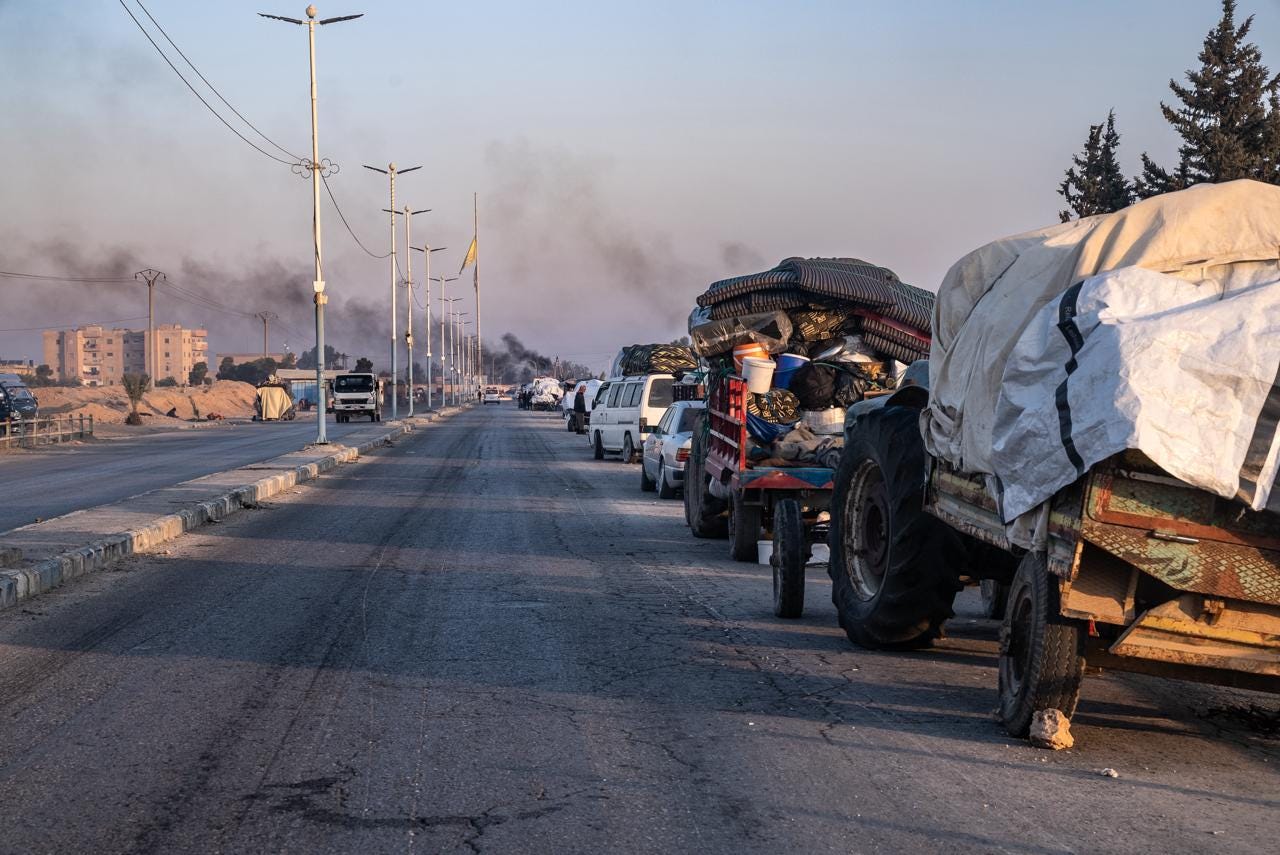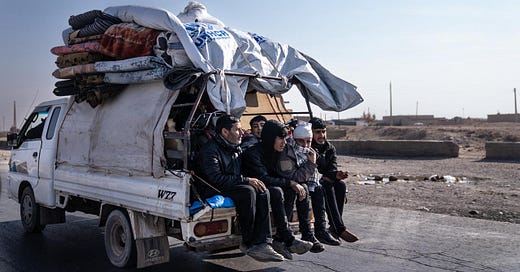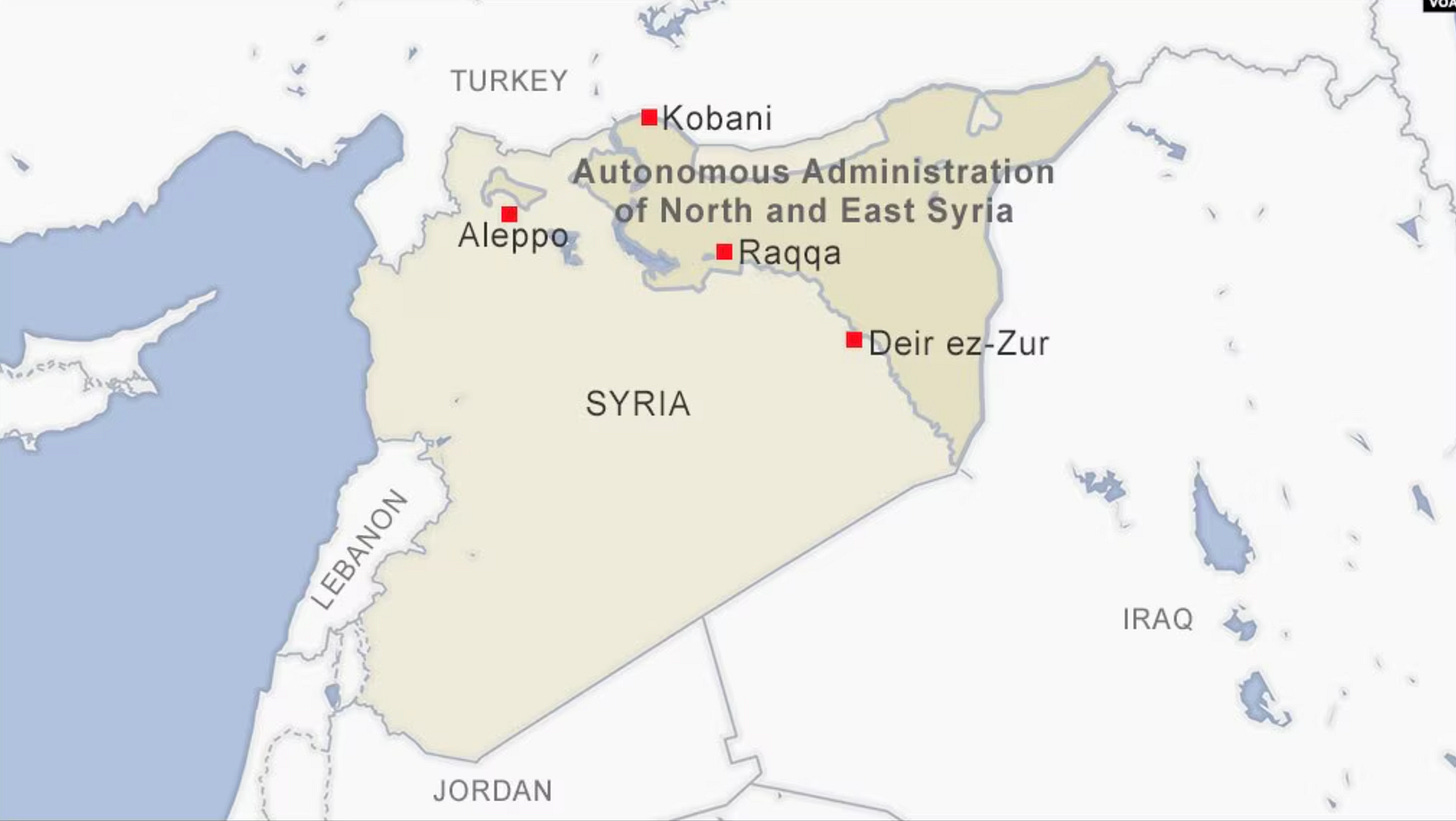For those of us who have covered war in the Middle East over the last 25 years, none could imagine what might finally bring an end to a half century of Assad rule in Syria: a coalition led by Islamic terrorists—one pledging not to annihilate but protect minority Christians, and with strategic help from a sworn enemy, Israel.
That’s what happened as Hayat Tahrir al-Sham militants launched from their base in Idlib early this month to take Aleppo, once the country’s largest city. Next they forced the Syrian army to stand down as they moved to Damascus, the capital. In under two weeks HTS by Dec. 8 had brought down the government of President Bashar al-Assad.
As Syrians poured into streets this week to celebrate, and tens of thousands of prisoners walked free from one of the world’s cruelest regimes, the sectarian divides that marked almost 14 years of civil war seemed to recede like Red Sea waters, miraculously.
“Everything you are afraid of is gone,” a medic reassured one shocked prisoner after a CNN team found him in an abandoned prison. For survivors, the long war brought unthinkable atrocities, yet the triumph came in a nearly bloodless 11-day offensive.
In this first week of new days for the country, it’s becoming clear that casualty counts are far from over. While much of Syria may be stabilizing, in the northeast—where U.S. forces to combat ISIS are still based and allied forces control territory—shelling has been heavy. Reports of atrocities and forced displacement are on the rise. Within days of Assad’s ouster, say eyewitnesses, at least 300,000 Syrians have been forced to flee new threats in Syria’s northeast.
“We are seeing human rights abuses and horrible atrocities,” said Brad Hazlett by phone from the area. Hazlett directs Partners Relief and Development, a Michigan-based NGO that’s helped to rebuild 17 schools and maintained humanitarian work in Syria throughout much of the war. Hazlett came to join his local team as HTS began its offensive, sensing the work could be at risk.
On Sunday, just hours after it became clear the Assad government was finished, Hazlett’s team began to see families on the run from the west “in huge numbers,” he said.

They say their communities are under assault by Islamist militant groups other than HTS. The FSA or Free Syrian Army operates in the area and in just days seized the city of Manbij—where U.S. forces once based—and areas near Afrin and Raqqa. Its aim now is to take Kobani, the Kurdish stronghold where local forces with U.S. air support fought off a nine-month siege by ISIS in 2015. The FSA is supported with airstrikes, drones, and artillery fire by Turkey, which shares a nearly 600-mile border with Syria in the north and is looking for an expanded buffer zone.
Hazlett found children asleep on the pavement with little protection from the cold, he said, as families, mostly farmers, reported being forced from their homes by ISIS and other militants. Some were marched out at gunpoint and some killed. Others fled on foot or by car. At one collection point where medical teams attended the displaced near the city of Raqqa, a mother arrived holding her infant, who had died from the cold. The family had traveled overnight by tractor in freezing temperatures to reach safety.
”There is total desperation here even amid celebration,” said Hazlett. “With mass exodus there’s nowhere for these people to stay.”
The Partners team scoured local shops for blankets this week and will likely convert at least five schools to shelters. International NGOs and monitors aren’t in evidence, so help for swelling numbers of displaced people will come from local workers already contending with bombardments and uncertainty.
The Syrian war has spanned four U.S. presidencies, from Obama to Trump to Biden and now Trump again. After supporting opposition groups seeking Assad’s ouster , U.S. policy over time narrowed to fighting Islamic State militants in Syria and Iraq. The Kurdish-Christian-Arab coalition in Syria’s northeast proved pivotal and U.S. Special Forces operated out of the region to defeat the militants. An autonomous region led by Kurds has protected the diversity and strategic importance of the region, which is rimmed by hydroelectric dams, the Tigris and Euphrates Rivers, and has oil reserves. The last battle against ISIS took place there near the strategic Euphrates River city of Deir Ezzor in 2019.
A Christian population estimated at 120,000, along with the remains of some of the oldest churches in the world, won protection in the autonomous zone. So have Sunni Arab tribes who opposed the Assad regime. Christian and Arab parties help to lead the region’s Syrian Democratic Council. Aramaic, the first-century language still used in the ancient churches, is an official language alongside Arabic and Kurdish. Many saw the zone’s governance structure as a potential model for a post-Assad Syria.
Now its future is less clear. Turkey has assaulted the region since Assad lost power, seeking to expand its buffer zone against what comes next. So have U.S. and Israeli forces. President Joe Biden said he was “clear-eyed” about the possibility of an ISIS resurgence and targeted Assad’s military installations with at least 75 air strikes this week, while Israeli forces hit suspected chemical weapons arsenals before they could fall into militant hands. Repeated Israeli strikes on Syria throughout recent months not only degraded Hezbollah and Assad’s support for militants targeting Israel, but paved the way for HTS to overtake Assad’s military.
Meanwhile, HTS on Dec. 10 said it had taken control of Deir Ezzor, fighting the U.S.-backed Kurdish forces that only days before took it from Assad’s Syrian army. HTS says it will take other cities in the northeast too, but it’s unclear whether it will take on Kurds in the autonomous zone and their allies to do it.
HTS leader Abu Mohammed al-Jawlani vowed at the outset to reassure Christians and other religious minorities that he embraced pluralism in a post-Assad Syria. His group since 2022 has helped to rebuild and reopen churches in Idlib. I talked to one source who confirmed that Christians in Aleppo received similar assurances. But al-Jawlani (also Jolani or Julani) brings to the table a checkered past.
At the start of the Iraq War in 2003, al-Jawlani traveled from Syria to Iraq and joined Islamic State. He spent five years in a U.S-supervised prison and earned a $10 million bounty as a wanted terrorist. He returned to Syria at the outbreak of war in 2011, formed al-Nusra Front, which began as an al-Qaeda affiliate and for a time received U.S. funding when it later joined with other opposition groups. Al-Nusra in bloody battles took the lead in capturing from Syrian forces Idlib province southwest of Aleppo.
Rebranding his group as Hayat Tahrir al-Sham, al-Jawlani broke with ISIS in 2012 and with al-Qaeda in 2016. He fought both, and manuevered HTS away from international terrorism and into disciplined force focused on ousting Assad. Yet HTS in governing Idlib province held sway over a Sharia Committee that pursued brutal practices against Idlib Christians, confiscating their property and imposing fees that forced many to flee. Experts say the group has adopted new goals and tactics but retains its extremist ideology.
For now, one Assyrian Christian leader told me, “We have questions rather than answers.”
Other news—
Israel: U.S. Secretary of State Antony Blinken shuttled across the Middle East to win support for a negotiated settlement in Gaza after Hamas appeared to give in to a key Israeli demand: that its forces remain in Gaza temporarily.
Ukraine: Russia's 12th major assault on the energy system this year damaged power facilities in several Ukrainian regions and forced authorities to impose even longer electricity cuts for millions. As the war enters its third winter, power plant workers are frontline fighters too, staying above ground in rooms protected by sandbags to keep the lights and heat on manually.
“We know there are missiles coming at us ... To say we're not afraid is not true because we are all living, normal people and we are afraid," said Serhii, 52, a shift leader who has worked at the plant for over 30 years.
Nigeria became the latest country to begin giving children the relatively new malaria vaccine, after clinical trials show the latest vaccine helpful to counter what is the leading cause of death among children under 5 in Africa. Nigeria accounts for about a quarter of malaria deaths in Africa.
Nicaragua: President Daniel Ortega’s regime has ordered nuns to leave the country by the end of the month as part of an ongoing crackdown on the Catholic church. Catholics make up four-fifths of Nicaragua’s population. Last month the government expelled Bishop Carlos Enrique Herrera Gutiérrez of Jinotega, president of the country’s bishops’ conference, and banned Jesuit clergy. Ortega also has closed churches alleging they shelter anti-government protesters.
France: Enjoy Yo-Yo Ma’s solo performance at the opening ceremony of Notre Dame in Paris on Sunday.
Homefront: Nearly three months after Hurricane Helene struck my hometown, Asheville, local officials last week gave us the first aerial view of storm damage at the North Fork Reservoir, which supplies nearly all the city with water.
Homes and businesses across this city were without running water for three weeks and didn’t get potable running water for six. It’s been a crucible, but churches and many others have stepped in with good cheer and needed help.





I'm glad to read your report, bringing some clarity to a chaotic situation. Praying for stability, freedom and provision for those who have suffered so much.
Thank you for the details regarding Syria. Now I need to create some sort of spreadsheet to keep all the competing factions straight--while I pray for the civilians trapped in the midst of the evolving conflicts.